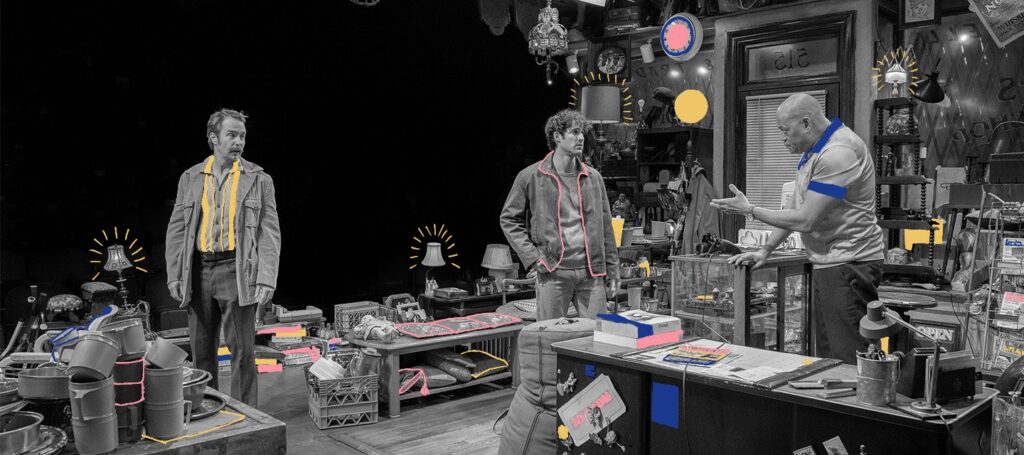


In ‘American Buffalo’ Nostalgia Gets in the Way of Progress
Somewhere in America older men impart wisdom to the younger between puffs of smoke and swigs of Coke. Somewhere in America, life is a powder keg with a short fuse, and morality is but an afterthought, as is breakfast. Somewhere in America, everything hinges on a coin.
At the center of American Buffalo, David Mamet’s play from 1975, the titular object of desire and subsequent conflicts is a buffalo head silver nickel (struck by the US mint between 1913 – 1938). Donny Dubrow (Laurence Fishburne), the proprietor of a junk shop in Chicago, sold the coin to a collector for $90 prior to the start of the play. Realizing that the buyer had struck a bargain, Donny decides to plot a heist with Bobby (Darren Criss), a former junkie he’d taken under his wing, to get the coin back.
However, the plan starts to fray at the seams when Donny begins to question Bobby’s loyalty, or rather, sobriety, as the younger man seems to botch every task he’s given. More players enter the game: Walter “Teach” Cole (Sam Rockwell) convinces Donny of Bobby’s incompetence and takes over the operation, and Donny, who doesn’t find Teach’s braggadocio reassuring, recruits yet another partner. A boxing match of negotiations ensues between the men, all of whose lives teeter on desperation. Their plans continue to unravel until they eventually crumble under the weight of distrust and their lack of criminal mastery.
The whole thing is set in a junk shop (set designed by Scott Pask), where, stocked from floor to ceiling, are symbols of forgotten dreams: from rows of chandeliers to a creepy doll, from a beaten-up Coca-Cola sign to piles of unworn ties. It’s a rather fitting environment for this particular American tragedy, where the process of rummaging through and squeezing value out of seemingly useless things, is reflected in our characters’ struggle at the bottom of a capitalist food chain.
Here we have a small yet captivating ensemble of three: Criss’ Bobby is earnest in an innocent, endearing way, and while the character is not all there, the performer makes a lasting impression. The straight-talking, tough-loving father figure to the younger man, Donny, is a calming presence because of Fishburne’s grounded and calculated choices. And Rockwell, with his mustache, comb-back, and over-the-shirt gold chain, seems to vibrate in such an intensity that you can’t help but be charmed: he gets you to focus on every word he says, and follow his emotional journey no matter how erratic it might be.
There is no denying the technical merits of the production. From the meticulous designs to the dynamic scene works between the performers on top of their game, everything is well executed. And yet, the story itself feels formulaic, as does the structure. One might argue that those are the marks of a classic, and in 1975, perhaps it was groundbreaking, but I can’t help but wonder, are we simply trying to squeeze out values from a junk shop piece out of nostalgia even though we’ve evolved away from it?
So, what indeed is the literary merit or legacy of American Buffalo? It is hyper-focused on characters and language by design, which makes it a HIIT workout for those versatile actors. However, while the characters are interesting to a point, they are not altogether complex, nor do they change over the course of the play, which I can see is at the core of this tragedy.
However, in 2022, do we still need to bring into focus the brutal men who refer to women as “cunt,” or say things like “guys like that, I like to fuck their wives,” men whose idea of problem-solving goes from zero straight to fists and guns? And, are we meant to sympathize with them and continue to center them in narratives simply because they exist, and will persist in the hell loops of their own making?
These days I find it hard to take David “he did a great job as president” Mamet’s point of view objectively, but I do think we need to take it seriously. His voice represents the part of the country that liberal America finds hard to see, or admit its pervasiveness. I take this voice seriously because we go to the theater to see the world in all its glory and ugliness. The question remains, however, is Mamet’s the only lens we can find for this particular purpose?
Perhaps the real tragedy is the fact that American Buffalo remains relevant today at all. But is it truly still the gold mine from which we attempt to dig up the “real” America, or a junk shop for us to rummage through for value and relevance?
I hope that somewhere in America, Donny’s life doesn’t crumble from one miscalculated transaction, and Bobby finds a way out of becoming collateral damage in someone else’s agenda; I hope that somewhere in America, Teach doesn’t need firearms to make himself feel comfortable and dreams don’t disintegrate with the flip of a coin.
Keep Reading

A Diluted ‘Little Prince’ Leads to Disenchantment
There was a child seated behind me at the Broadway Theatre the evening I attended The Little Prince. The boy was roughly the age I was when I first learned of Antoine de Saint-Exupéry’s exceedingly charming, poignant, heartbreaking tale. The child was getting excited, asking questions, enthralled by the pretty rainbow lights filling the space, […]
Read More
A Recipe for Love is Served in ‘Birthday Candles’
Familiarity often breeds contempt but in Noah Haidle’s Birthday Candles, it also serves as the ingredient of love. Over the course of the 90 minutes of this tightly calibrated Broadway debut, that love transforms Ernestine (Debra Messing) from a rebellious 17-year-old on the cusp of greatness into a 107-year-old great-grandmother who holds her family together. […]
Read More












